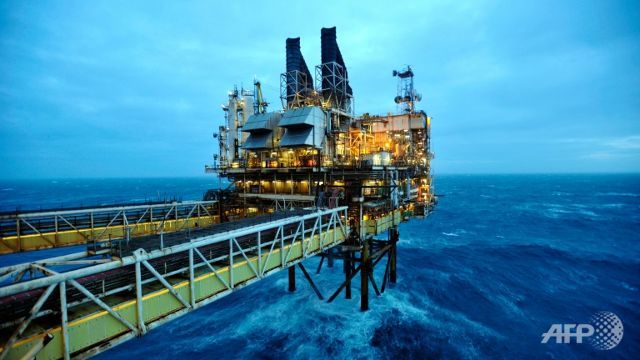Oil prices surge as non-OPEC producers agree on caps
 |
| An oil drilling platform. (Photo: AFP/Andy Buchanan) |
Indices in London, Frankfurt and Paris pulled back after soaring last week when the European Central Bank decided to extended its massive quantitative easing (QE) stimulus to December 2017.
At the same time, markets are on tenterhooks before a widely-expected interest rate hike from the US Federal Reserve on Wednesday.
"Markets are taking a breather after a strong run ... and Fed risk this week," City Index research director Kathleen Brooks told AFP.
"Oil is in focus, so too is central bank risk, but overall we think it is low (trading) volumes as markets wait for the Federal Reserve before piling back in - or not, depending on the outcome."
Oil prices surged over two dollars per barrel after 11 non-OPEC countries agreed to huge cuts in crude production, while OPEC kingpin Saudi Arabia also signalled a bigger reduction in output than previously agreed.
The non-OPEC oil producing nations, led by Russia, said they would pump more than half a million fewer barrels a day from next month in an effort to address a supply glut that has scythed prices over the past two years.
That gave a shot in the arm to the energy sector because rising oil prices translate into higher revenues and profits.
"It is a little surprising that investor sentiment is not more upbeat ... given the latest leg higher in the oil price," noted XTB analyst David Cheetham. "The main scheduled event that will be driving markets this week is the Fed meeting."
There seems little room for doubt that the US central bank will raise the benchmark interest rate in the coming week for only the second time in a decade.
With unemployment at a nine-year low, jobs being created at an average of 180,000 per month, the economy growing at better than three percent in the most recent quarter and some signs of a pickup in inflation, the writing is on the wall.
The Dow held steady in opening trade on Monday, but the S&P 500 and Nasdaq Composite both retreated from record closes set on Friday.
ITALY LIFT
Elsewhere, there is lingering uncertainty over the future of Italy's troubled Monte dei Paschi di Siena (BMPS) bank.
"Speculation has continued to abound as to the fate of Italy's oldest bank which is one of the best performers on reports that Italian authorities will bail out the bank to protect client savings, in the event it is unable to scrape together the private finance it needs to stay afloat by the end of this month," said Michael Hewson, chief market analyst at CMC Markets.
BMPS shares jumped 3.7 per cent, after having fallen 10.5 per cent on Friday when the ECB said it wouldn't give the bank an extension beyond the end of the month to put together a deal.
The plight of the world's oldest bank has raised broader concerns over the eurozone's third-largest economy.
Italy's main stocks index pushed higher, with sentiment boosted after Paolo Gentiloni was on Sunday named Italy's new prime minister following Matteo Renzi's recent resignation.
What the stars mean:
★ Poor ★ ★ Promising ★★★ Good ★★★★ Very good ★★★★★ Exceptional
Latest News
More News
- Russian President congratulates Vietnamese Party leader during phone talks (January 25, 2026 | 09:58)
- Worldwide congratulations underscore confidence in Vietnam’s 14th Party Congress (January 23, 2026 | 09:02)
- Political parties, organisations, int’l friends send congratulations to 14th National Party Congress (January 22, 2026 | 09:33)
- 14th National Party Congress: Japanese media highlight Vietnam’s growth targets (January 21, 2026 | 09:46)
- 14th National Party Congress: Driving force for Vietnam to continue renewal, innovation, breakthroughs (January 21, 2026 | 09:42)
- Vietnam remains spiritual support for progressive forces: Colombian party leader (January 21, 2026 | 08:00)
- Int'l media provides large coverage of 14th National Party Congress's first working day (January 20, 2026 | 09:09)
- Vietnamese firms win top honours at ASEAN Digital Awards (January 16, 2026 | 16:45)
- ASEAN Digital Ministers' Meeting opens in Hanoi (January 15, 2026 | 15:33)
- ASEAN economies move up the global chip value chain (December 09, 2025 | 13:32)
















 Mobile Version
Mobile Version